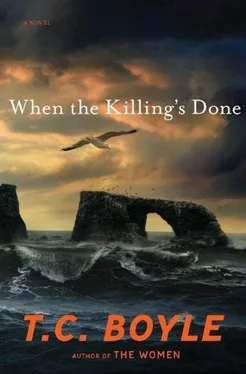The light faded to gray. Shadows fell away from the walls. She made out an irregular shape on the floor of the entryway, something that didn’t belong, and it took a moment for it to cohere out of the dimness: a blue backpack, its flap flung back on a box of dehydrated meals in silver pouches. Beyond it, there was a jumble of clothes and equipment, manufactured things, shucked wrappers, crumpled cans, three twelve-packs of Tecate stacked haphazardly one atop the other in their flame-red jackets. The smell she remembered — mild and botanical, the odor of dry rot, mold, the dehisced seeds of the plants that drifted through the broken panes and settled in the cracks of the floorboards — was different now, coppery and hard, with an overlay of the mechanical, of oil, gun oil, and here were the rifles, two, three, four of them, propped against the back wall like an exhibit in a gallery.
The sleeping bags she found laid out on the floor of the main room, a pair of Coleman lanterns propped up beside them in a scatter of hunting magazines— Oregon’s Mule Deer Paradise, Ozarks Bear and More! — and a yard-long ice chest, orange and white plastic, set like a bench beneath the lintel of the shattered window. She heard Bax call out her name, but didn’t answer. Inside the ice chest, amidst a slurry of melting ice, were two plastic-wrapped slabs of meat, what looked to be a liver in one and four or five crudely cut steaks in the other. Behind her, at the door, there was the sound of a heavy footfall and then the thump and grate of the crutches. Bax’s voice echoed through the emptiness: “Rita, where in hell are you?”
Still she didn’t answer. She was too angry, each crumpled cigarette pack and balled-up wad of underwear or grease-stained rags infuriating her anew, and what did they think this was, a hotel? A flophouse? She took the stairs two at a time, cursing under her breath. At the top of the stairs was a door, and that was strange, because she hadn’t remembered a door there at all. She couldn’t be sure, but it looked as if it had new hinges, or at least they’d been newly oiled and scraped of rust. She lifted the latch and pushed the door open, and here she was surprised — or no, shocked and outraged — all over again.
The room had been transformed. The floorboards gleamed as if they’d been varnished, or if not varnished at least scrupulously swept and mopped. And the windows — there were two of them, set in the side and back walls — were covered in plastic sheeting, which had been carefully affixed to the window frame with duct tape. A camp bed stood against the far wall, complete with blankets, pillow, sheets and pillowcase. There were jackets and shirts suspended from nails driven into the wall above it, another backpack — this one in plain unvarnished khaki, as if it were military issue — set atop a slab of driftwood beside the bed, a crude desk and chair fashioned from produce crates squared off against the wall opposite. And worst of all, a fleece, a tanned fleece splayed out on the floor in front of the bed so the sheep killer wouldn’t have to get his feet cold when he shucked off his boots, strung his bow, sharpened his steel-tipped arrows.
“Rita?”
She was frozen with hate. “Up here,” she called. “I’m upstairs.” She could hear Bax scraping around below, muttering to himself. And then, as if she needed anything more to provoke her, vinegar to rub in her wounds, a jab with a sharp stick, she saw what was on the table. There, beside a Coleman lantern and half a dozen paperbacks, was a hunting magazine turned back to a full-page ad. From a distance, it looked as if a huge pair of binoculars was staring out from the page, but when she snatched up the magazine, she saw that she’d been looking at two circular photographs, one of a boar flashing its tusks and the other of a ram, a Rambouillet ram, perched on a crag. The legend at the top read: Eldon Thatch’s Island Hunt Club. There was a phone number and a Ventura address, followed by a price list: $750 for a razorback boar, $1,000 for a trophy ram and two meat sheep. Meat sheep . What went through her mind in that moment wasn’t so much a thought process as it was an escalating flood of images, each more bitter and ironic than the last. Their sheep, their rams, the animals they’d paid for themselves and broken their backs over, nurtured, docked, dipped, were going to be hunted down— were being hunted down — at prices that were twenty times what they could get for them. And by strangers. Interlopers. Jerks.
In the next moment she was sweeping everything — bedding, paperbacks, the lantern, even the plastic sheeting she ripped from the windows as if she were ripping the skin from their backs — into one of the wooden crates, and in the moment after that, her breath coming so fast she might have been hyperventilating the way she had over the lines of coke Toby would chop and lay out for her any time of day or night whether she wanted it or not, and she did want it, she always wanted it, she was bumping the thing down the steps and yelling out to Bax, who was standing there at the base of the staircase gaping up at her, to get out of her way. “What in Christ’s name?” Bax said. “You can’t touch this stuff, this is private property, this is—”
She said nothing. There was no time for debate — she was in the grip of something here and it was going to play out whether or not he liked it or Eldon Thatch liked it or Pier and Francis Gherini or the commander of the Coast Guard himself. Down the stairs, across the floor and out the door to the yard, Bax clumping behind her. She overturned the box and dumped everything in the mud. Then she snaked past Bax, who was rumbling away at her in a language that was English, insistent and harsh, but might as well have been Mandarin Chinese for all the effect it had on her, propelling herself back into the house, to the main room now, stuffing the sleeping bags in the box, the backpack full of just-add-water meals, the magazines, the beer, even their rolls of toilet paper. She dragged it all outside and dumped it there, and if she heard the scream of the three-wheelers on the hill above or the harsh machine-gun clatter of the helicopter blades that could only mean that the owners were on their way to deliver their poisonous news in person, it didn’t matter a whit. Because she squared her shoulders and went straight to the truck and the spare can of gasoline Bax kept behind the passenger’s seat and in the next moment the sweet smell of benzene rose to her as she sloshed it over the whole mess and then reached deep in the pocket of her jeans for a match.
So it went up, all of it, before Bax or anybody else could stop her. And Bax did try to stop her because he was the peacemaker, the coward, the dog who would roll over on his back so the owners could scratch his belly and then sell the concession out from under him. She watched the flames rise, roiling and bright, the lanterns bursting with the violent release of their kerosene, the food pouches popping like firecrackers, cotton and leather and Gore-Tex shriveling away to nothing while the foam pads beneath the sleeping bags sent up an evil oily black smoke that forked into the sky and hung there overhead like a tattered umbrella. When Bax did get to her — scrape, clump, scrape — she swung round on him, furious. “Do you know what they’re doing? Do you have any idea?”
“I don’t care what they’re doing, you don’t come into somebody’s house—”
“Somebody’s house? This is nobody’s house. This is our house. Part of our ranch, part of what we’re paying through the nose to lease.”
“—and destroy private property. It’s not right. It’s crazy. You’re fucking crazy, you know that?”
“Yeah? And so what are you then? They’re selling our sheep, Bax, our rams that we. . for any jerk with a gun to just. .” She felt herself giving way, all the jolts and frustrations of the day tearing loose inside her, and her eyes were wet suddenly. “A thousand dollars, Bax, they’re killing our stock for a thousand dollars for one ram and two meat sheep. Meat sheep, for God’s sake!”
Читать дальше












